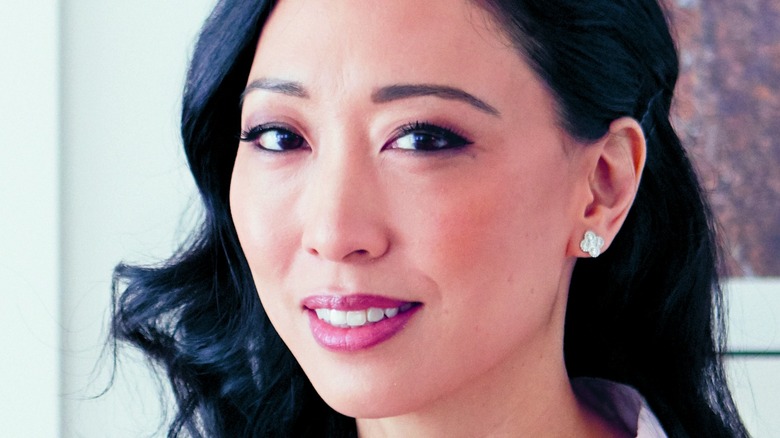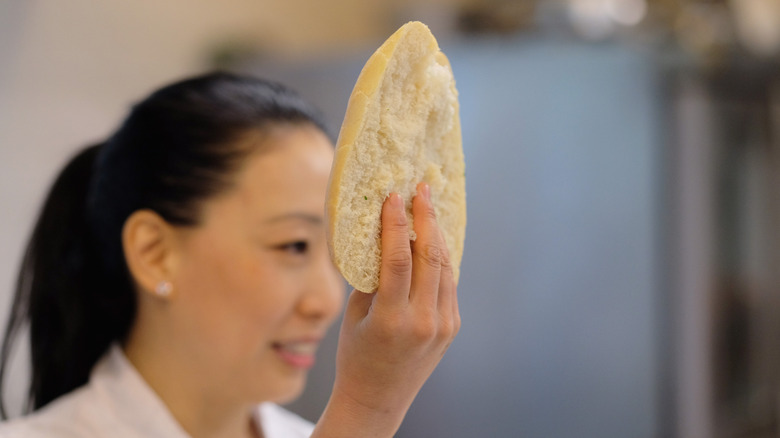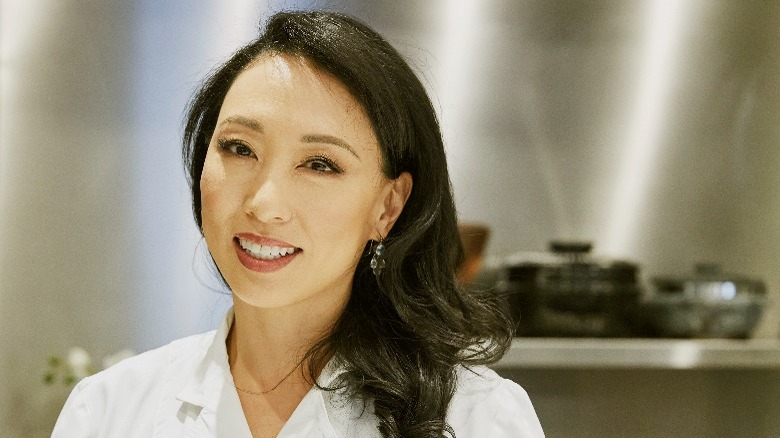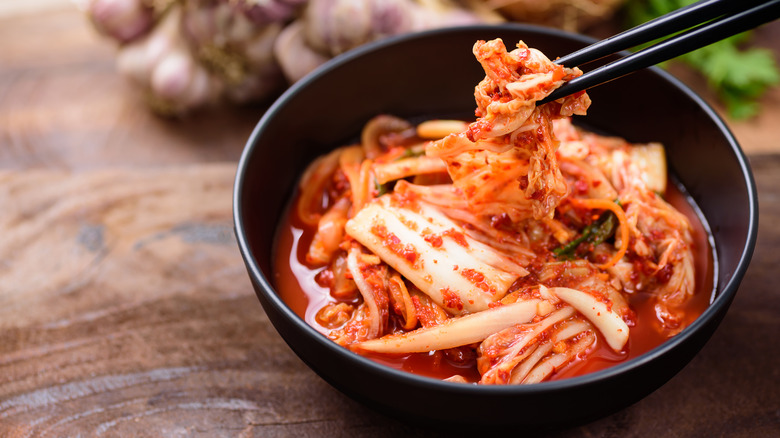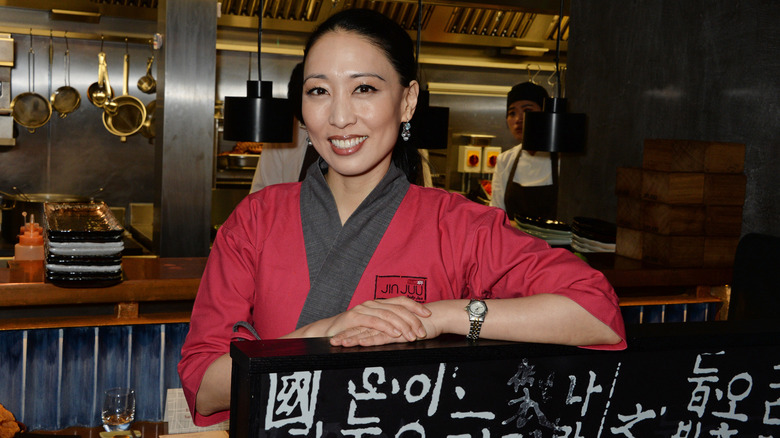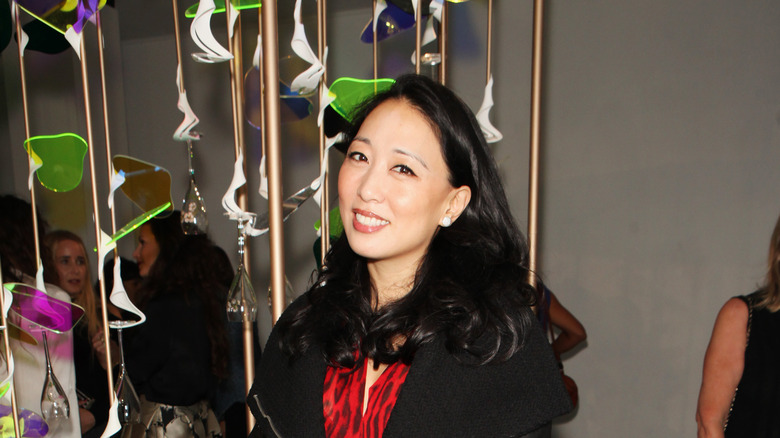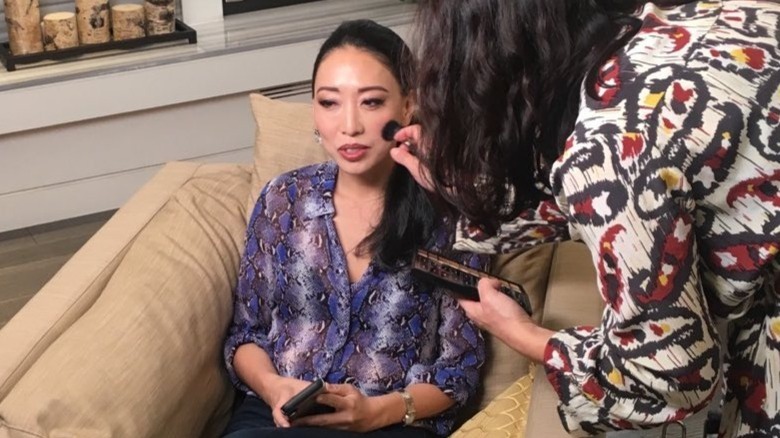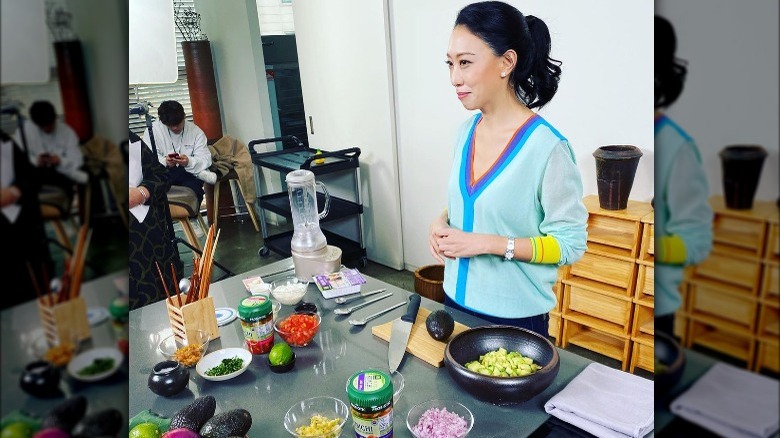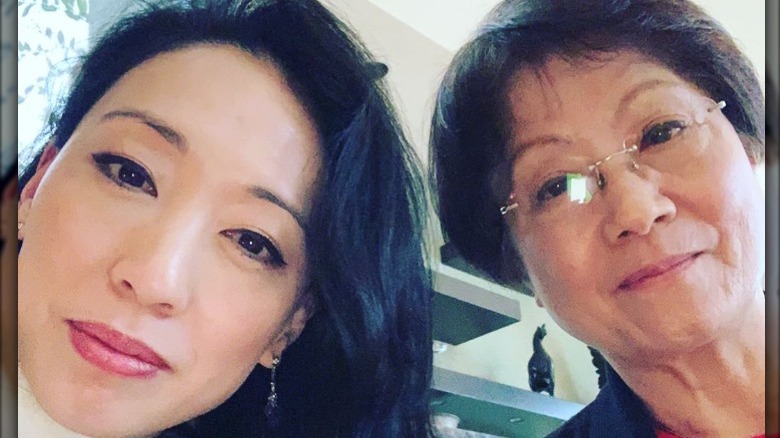Judy Joo Talks Iron Chef, Food Critics, And Mother's Day - Exclusive Interview
We may receive a commission on purchases made from links.
Don't make the mistake of thinking that Iron Chef Judy Joo might not have earned every single letter in her title. If there were a Carbon Steel Chef, Joo would have knocked that competition out of the water, too. Meet the woman who dominated on Wall Street before setting aside that prestige and pursuing the excitement she felt when cooking — only to find a shockingly parallel world. "Orders are urgently hollered across the kitchen, the way trades echo over an exchange floor," Joo wrote in a Wall Street Journal piece exploring the similarities between the two aggressive, sexist industries. Still, she predicted, more women would rise to the top of the culinary world.
They have, and Judy Joo certainly has. The world famous chef survived hazing in Gordon Ramsay's flagship restaurants (stay tuned for more, later). She became the world's second female Iron Chef and an Iron Chef judge. In the face of xenophobic and, at their best, ignorant restaurant reviews, Joo has opened two triumphant Korean restaurant concepts: Jinjuu — which Joo has since sold — and Seoul Bird.
In this exclusive interview with Mashed, Joo explores the passion for food, especially Korean food, at the center of her drive, her journey to the top and her experiences on "Iron Chef." Also — because we know you're scrambling — we asked Joo to pass on tips and tricks for how to successfully celebrate (and cook for mom) on Mother's Day.
Judy Joo reveals the secret to a good burger
One of your favorite parts of being a chef is inventing new dishes. Can you give us a hint as to anything you're working on at the moment?
I'm always working on new things, depending on what I'm up to. I just spoke and did a panel at the CIA in Napa this past weekend and it was all around plant-based foods. I developed a whole bunch of plant-based recipes for them, so I was working on that. Before that, I was working with a whiskey brand and was developing recipes based around their whiskey, which is fun.
We are also working on an initiative with our charity partner, which is called CALM. It's the Campaign Against Living Miserably, and we're working on a series of burgers, which are going to be endorsed by some celebrities here, all from different ethnic backgrounds. We're working with them to try to figure out what burger it will be and how it represents their cultural background or the food that they love. A certain percentage of the proceeds will go to our charity of choice.
What's the most important aspect of a good burger?
We're doing everything around our Korean fried chicken burger. They have to use the chicken, whether it's a plant-based form of chicken or if it's a grilled chicken or a fried chicken, so that's the main protein. The sauce is where the secret lies. The secret's always in the sauce! You can take a vehicle like chicken and the roll and add whatever sauce you want. It completely transports you to a different part of the world, whether it's a chicken tikka masala sauce or a chicken katsu curry sauce from Japan, or maybe it's some type of sambal or rendang-type sauce from Indonesia. Maybe it's a Cool Ranch dressing with an American New York Buffalo sauce or something like that.
You have assimilated such diverse food experiences across so many different cultures now, if you could pick one chef to cook a meal for you, who would it be?
It would be Jiro, the sushi chef, from "Jiro Dreams of Sushi" because I'm a massive sushi lover and I love going to Nakazawa in New York. It's one of my favorite meals and Nakazawa is Jiro's apprentice and his protégé. I would love to have Jiro cook for me.
And in the opposite direction, do you do fast food at all? And if so, what is your favorite fast-food order?
Taco Bell, I don't even have to hesitate. Taco Bell, beef, corn shell tacos with their special sauce.
The foundations of Korean cooking
The Korean philosophy, that food is medicine, is something you've been spreading through your work. How do meals change when that philosophy is at the center of meal prep and enjoying food?
Food is medicine, but this is also based around the rule of five. In Korean cooking, [the rule of five is] really the foundation of it, that you're supposed to have the five flavors, the five textures, and the five colors in every single meal. If you do this, the philosophy around it is that you'll get all of your vitamins and minerals and nutrients in one seating. Then, you are taking care of your entire body. In order to support gut health, you need to eat a wide variety of different foods. It's the best way. No matter how many probiotics you take, you really should eat a wide and varied diet. That not only means different types of foods, but also different types of preparation.
You should have things that are raw, things that are sautéed, and things that are perhaps fermented or pickled ... [You need] lots of different colors and types of vegetables and fruits and fish and a bit of meat and all different types of things. That's why in Korean food — when you sit down — it's [presented in the form of] banchan, side plates — they call it mezes in the Mediterranean or Middle Eastern culture, also. You have this whole sharing concept, so you can have lots of different types of food. Koreans are obviously meat-eaters, but we don't just eat meat, it's meat and 16 other types of vegetables and other things around it.
You wrap the meat in fresh lettuce and you always have kimchi, which is fermented vegetables and lots of different things with it. It's a very healthy way of eating and a very interesting and satiating way to eat. You never really have FOMO when you eat in this Korean style, because you get a little bit of everything.
How to use kimchi
You're a self-proclaimed hot sauce fanatic. You've admitted to having 25 different kinds of hot sauce in your fridge. Give us the [scoop] on that.
I'm addicted to the spice, and I love fresh chilies. I love everything from harissa to gochujang, to Tabasco, to some Caribbean Scotch Bonnet pepper sauces to XO sauce. I can tour the world in my hot sauces. There's a purpose and a use for all different ones. Sometimes, if I want something that's quite earthy, I'll go for my gochujang. If I want something a bit brighter and tangy, maybe a vinegar-based one, and [for] something that is a bit smoky, I'll go for one of my Mexican hot sauces with the smoked chipotles and stuff. They all have different flavor profiles and I choose accordingly.
What's the single ingredient you could not live without?
I would say kimchi. Is that an ingredient?
One of the cornerstones of Korean food is kimchi, which you've said you've compared to Italian pasta sauce. There are hundreds of different kinds of kimchi, you eat it with everything. You've personally added it to mac and cheese and Bloody Marys. Is there anything that it doesn't go with?
Kimchi goes well with nearly everything. Kimchi and cheese is also such a match made in heaven, and it is a real thing in Korea. You're seeing this kimchi and cheese combination popping up everywhere, even here in London, [a] local grilled cheese sandwich place has it on their menu. [It's] two slices of sourdough bread and melted cheese, topped with kimchi. It is so good. I'm even putting it in Brussels sprouts these days, dehydrating it, and making an umami-filled kimchi powder that goes on top of all different things. [It goes on] popcorn and chips and things, and French fries. You can grill it and then add a nice smokiness to it, it's so versatile. You'd be hard-pressed to find something that it didn't go well with.
What is your favorite kimchi-inspired recipe?
That Bloody Mary is sweet, [it's] really damn good and addictive ... I really do love a kimchi tartare sauce or a kimchi bearnaise.
Judy Joo's Iron Chef memories
You've described getting cast on "Iron Chef UK" as your big break. As you reflect on that journey, do you have memories from the show that keep coming back to you?
That's a classic example of panicked learning, of like, "Oh my God, I've landed this role, and do I deserve it?" [It was a lot of] second-guessing myself and practicing and getting all the timings right [and] working with my team and rehearsing things and toning down the recipes, making sure that everything tasted fantastic and looked even better. [I had to add] those creative touches and [keep] doing everything and anything that I could to prepare myself and my team to win.
When you were filming "Iron Chef," you said in an interview once that one of your sous chefs cut himself and started bleeding over the place. What was that like for you? Talking about panicked learning!
That was Jamie. Yeah, he freaked out! That was actually funny, that was in New York. It's a lot for somebody to take in that hasn't had a lot of television experience, [and] that was his first time as one of my sous chefs filming in New York at The Food Network. It was very much lights, camera, action. [There were] 20, 25 cameras on you, roaming cameras in your face. You have Alton Brown making funny commentary and teasing you the entire time. He cut himself very badly and spaced out.
He had stage fright and he was looking in the air at one of the lights, bleeding with his mouth open. We were screaming his name, "Come back to us, come back to us," trying to snap him out of it. I think it was the shock of cutting himself, he was bleeding, the medics all over him, he's under all these hot lights. We were all covered in sweat. My other sous chef hit him on the back to bring him back, and then they clicked back to us. He was gone for a minute or something, yeah. I forgot about that. We should tease them about that one.
Does having experience competing on "Iron Chef" give you a different perspective when you get to the judges' table?
100%. I think that no one should judge that hasn't ever competed, honestly, because you can't appreciate it. You don't have that 360 view that lets you understand the blood, sweat, and tears that literally went into making that plate, and [you can't understand] how hard it is to produce five dishes in one hour using that one ingredient, and the creativity and the planning and the practice and all of that stuff — everything that is involved in getting those dishes out. You don't have the right lens of empathy to be able to judge it fairly. In the same way, I don't think critics should be food critics unless they've worked in the kitchen. They don't understand it.
Food critics and 'xenophobia'
You've opened several establishments now. One of the things you said when you opened in London, was that you had a hard time with some of the critics who were comparing your food to Thai food. How do you face those critics? How do you combat that? And how's the journey going for you now?
One of the critics [wrote something] — they realized, and they took the review offline, so you can't find it anymore — because it was massively inappropriate. [There was] cultural appropriation all over it. This particular person even wrote that they didn't see the point of wrapping food in leaves, which is hugely condescending entirely. [They] said that my food missed the flavors of fish sauce and the zing of lime.
When that's your full-time job, I'm sorry, but have the discipline to look it up if you don't know. The arrogance around that and the lack of knowledge and the ignorance of the cultural differences within Asia was shocking, and [they said] that my restaurant and another Thai restaurant, which they named by name, use all the same ingredients and they'd rather go there. It's absolutely ridiculous. I think it shows that there's a laziness or something.
People don't understand Korean food or Korea. We just hosted the Winter Olympics not that long ago. It's not a tropical country, we don't grow coconuts and lime or lemongrass. Figure it out! One critic, this person also said that they didn't understand how you could have a Korean restaurant without grills built into the table. Not all Korean restaurants are just about barbecue. The diversity of our cuisine spans much further than grilled meats, and it really soured my view of the industry here, because I couldn't believe it. I was getting in big fights with all the critics and losing, because they all banded together and called me whatever names, like "dumb American" or whatever.
I gave up and never got apologies. Actually, they should thank me, because I could have taken this to social media and really embarrassed them, quoted them, and particularly dug it up now in this day and age, where people are more aware of cultural appropriation and more aware of cultural differences, between Asian [countries]. You're calling yourself a food critic and yet you're saying these things. Where's your food knowledge, and where is your curiosity to look up [everything] that you don't know?
They were all about being dramatic –
Yeah, it's about sensationalism, with a smattering of xenophobia and misogyny and whatever. It's ignorant.
The advice that inspired Judy Joo to dominate
You got your formal training at what is now the International Culinary Center with Dorothy Cann Hamilton. You've said that she helped you navigate kitchens as a woman and also counseled you through your divorce, which was a turning point in your career path. Could you share the advice she gave you?
Dorothy was such an inspiration, because she was all about thriving and never giving up and doing your best at absolutely everything that you could. She was divorced, also, so she had been through it. She was like, "Take this stress and anxiety and transform that into will and productivity. Take all of that angst and nervous energy and use it towards your advantage. Somehow, try to channel that into a productive effort, and you will get knocked down a thousand times, a hundred times over, but keep on getting up and trying."
Failure is a big part of the journey. It is an integral part of the journey towards success. You have to get used to it, you learn from it, and you embrace it. She was such a calming person to talk to all the time. She was like, "Look, Judy, don't worry about it. Don't sweat the small stuff, move on and look forward. You can't change the past, don't play the 'would've, could've, should've' scenario in your head. Look at your mistakes, learn from them. Don't make them again and charge forward." She was such a visionary also ... I miss her dearly.
You took her advice running!
She was always like, "Go for it." She had this mentality because, as women, we always have this tendency to second-guess ourselves like, "Am I qualified? Do I have enough experience? Can I do it?" She's like, "Just do it. Go for it, and you're smart enough; if you don't know certain things, you're going to learn it." It's true — for whatever reason, because we're more thoughtful beings as women, we overanalyze things. I can absolutely say that I've been under-qualified for every single job I've ever taken in my life, and that's my vision of it.
Men would never say that, and I see it all the time in the businesses I run. The guys are always asking for promotions, and they're jokers. They show up late, their skillset level is low, all this stuff, whereas the women are incredible, they're technically flawless, they're never late, they never call in sick and they never ask for anything.
Working in Gordon Ramsay's restaurants
You grabbed onto this opportunity when you spent years working at Gordon Ramsay's restaurants. You got your foot in the door there. You've previously said that getting the job wasn't in and of itself wasn't hard, but lasting on the job was. Why is that?
There's a hazing element. Particularly back then, there was easily over 75% turnover. This is back when it was normal to work an 18-hour day. You'd go in at 7:00 [a.m.] and you left when the last check was served, after midnight. It was absolutely ridiculous. You would never be able to get away with that now. The hours were intense. You weren't allowed to talk in the kitchen a lot. It was one of these silent kitchens, and it was tough. You were always understaffed, and there was always too much work. You were lucky if you got to take your break. Yeah, it was normal back then. You wouldn't get away with that now, but it was definitely like, "You are here working at a three star [establishment] and you're going to work."
Judy Joo talks mother's day meal hacks
Let's go back to your origin story. You grew up with your mom, who made everything from scratch. You've talked about the vivid memories you have of making dumplings with her. What was the most important thing your mom taught you about cooking?
My mom was always tasting, so I would think it would be that. She would even taste raw meat all the time, she didn't care! I don't know how she got away with that, but she would constantly taste, and she taught me that act of cooking instinctively. She can never write down a recipe, because she would say, "It's a handful of this. It's half a handful of that. It's a little bit of this and more of that." Watching her and seeing how things came together and learning how to taste, and educating your palette — [those were] the most important [things she taught me].
What do you most enjoy cooking for your mom today or with your mom, if that's the case?
I love cooking dumplings with her, sitting there and stuffing dumplings and talking and catching up. That's such an enjoyable memory of mine that we've done ever since I was a little kid.
Do you have any tips for readers about celebrating Mother's Day that you could pass on to us?
You're cooking for your mother, so cook her favorite foods. Try to make something that she loves and enjoys, so maybe it's a recipe that she's taught you and that you could, for once, make it for her and see what she thinks of it. That's a good way to make sure that these recipes are passed on and don't die with a generation. You have to cook them, and to get to know them, and then to teach the next generation always.
It's something that is done with kimchi and the spaghetti sauces of the world in different cultures. Every family has recipes that should be treated like heirlooms. It could be something as simple as mom's Sunday pancakes or loaded tater tots or something. It doesn't have to be something that is majestic at all. It could be that simple bowl of chicken soup that hugs you back on a cold, rainy day after school.
Follow Judy Joo's Instagram for the latest from her everyday life and career. Her most recent book, "Korean Soul Food," is available for purchase.
